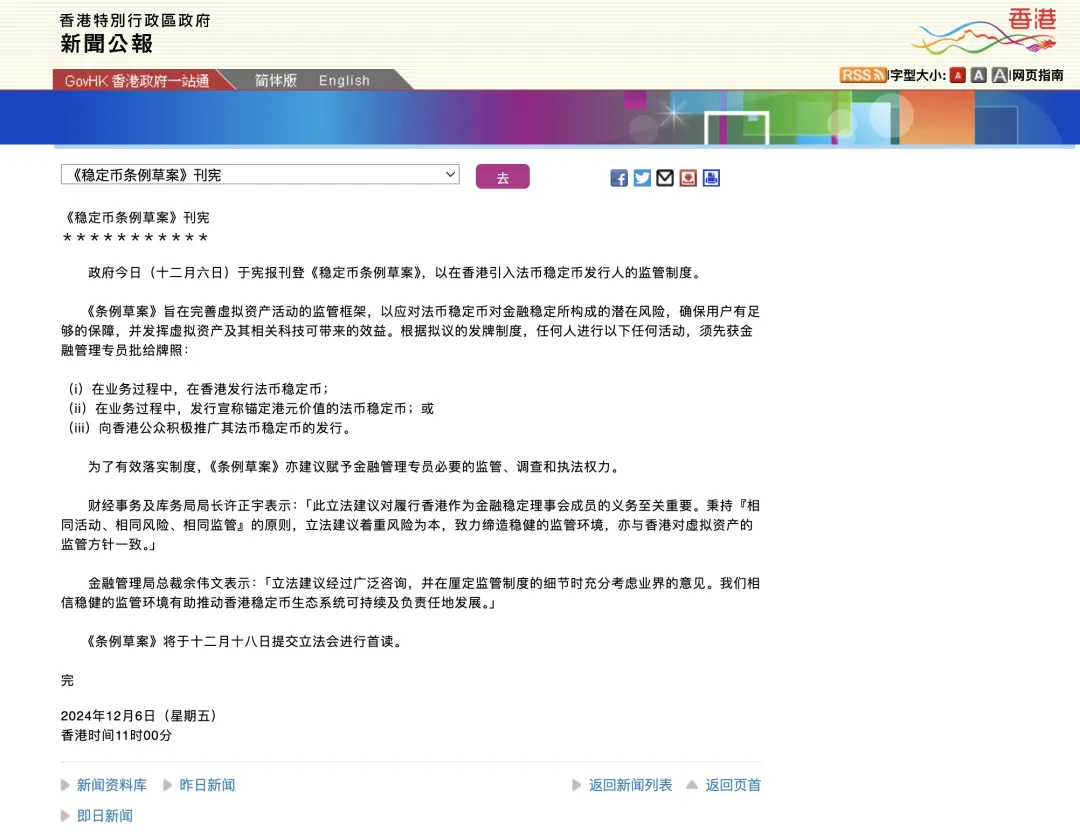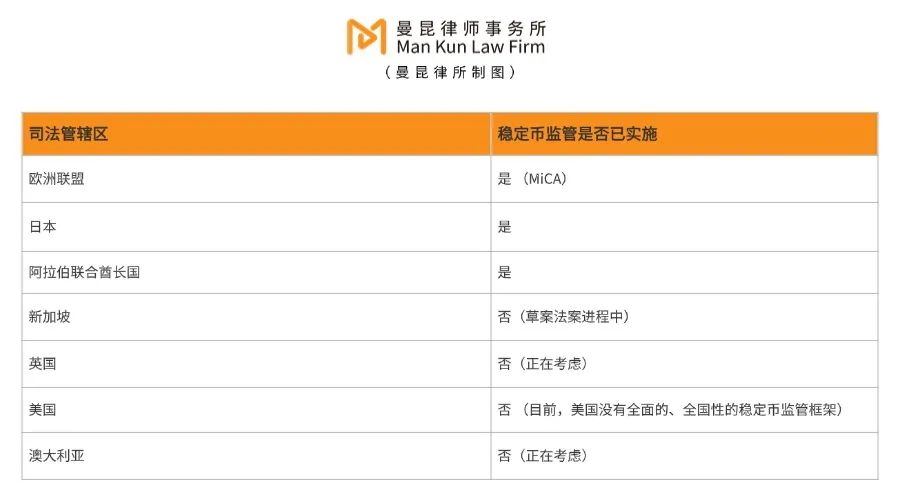On December 6, 2024, the Hong Kong government officially announced the stablecoin bill, marking an important moment for Hong Kong as a global digital asset hub. This long-awaited legislative initiative lays the groundwork for comprehensive regulation of fiat-backed stablecoins (FRS), aligning with global standards, addressing financial stability risks, and promoting innovation in the virtual asset industry.

▲ Screenshot of related news
The proposed framework requires any individual or entity engaging in the following activities to obtain the appropriate license from the Hong Kong Monetary Authority (HKMA):
- Issuing FRS during operations in Hong Kong;
- Issuing FRS that claim to be pegged to the Hong Kong dollar during operations; or
- Actively promoting the FRS they issue to the public in Hong Kong.
The bill also grants the HKMA the authority to supervise, investigate, and enforce compliance.
A Robust Approach to Stablecoin Regulation
The stablecoin bill is the result of extensive consultations with industry stakeholders and international best practices. It introduces key requirements for FRS issuers, including:
· Licensing: Mandatory licensing for issuers operating in Hong Kong or marketing FRS to the public in Hong Kong.
· Reserve Management: Issuers must maintain high-quality, highly liquid reserves equivalent to the value of the issued stablecoins.
· Capital Requirements: A minimum paid-up capital of HKD 25 million (approximately USD 3.2 million) or 1% of the face value of the circulating fiat-pegged stablecoins, whichever is higher.
· Risk Mitigation: Obligations include annual risk assessments, anti-money laundering/anti-terrorist financing compliance, and strict redemption policies.
The bill follows the Financial Stability Board's principle of "same activity, same risk, same regulation," ensuring that FRS issuers meet standards similar to those of traditional financial institutions.
Comparative Jurisdictions: Global Approaches to Stablecoin Regulation
As stablecoins gain attention globally, different jurisdictions have adopted various regulatory approaches. Hong Kong joins the ranks of those taking concrete steps to regulate stablecoin issuers. Here is a comparison of key jurisdictions in terms of regulatory progress:

Hong Kong's proposed system stands out for its focus on single-currency and multi-currency stablecoins, as well as its inclusion of both decentralized and centralized systems.
From Consultation to Legislation
The journey to the stablecoin bill began with the HKMA's discussion paper on crypto assets and stablecoins released in 2022, followed by subsequent consultation papers in 2023 and 2024. Recognizing the risks posed by FRS—especially their potential spillover effects between virtual assets and traditional financial systems—Hong Kong has methodically advanced this legislation. The bill reflects feedback from global regulators and local industry stakeholders, aiming to establish Hong Kong as a safe and innovative digital asset environment.
Currently, the HKMA regulates stored value facilities under the Payment Systems and Stored Value Facilities Ordinance, while the Securities and Futures Commission oversees virtual asset service providers under the Anti-Money Laundering and Counter-Terrorist Financing Ordinance. The new legislation will further complement these frameworks, filling the regulatory gap for stablecoins.
Licensing Requirements for Hong Kong Fiat-Pegged Stablecoins
The licensing framework under the Hong Kong stablecoin bill sets strict requirements for entities issuing or marketing FRS. These measures aim to ensure financial stability, consumer protection, and compliance with anti-money laundering and counter-terrorist financing (AML/CFT) standards.
Key Licensing Standards
- Reserve Management and Stability
· Full Asset Backing: Issuers must maintain reserves equal to or greater than the value of the circulating stablecoins. Algorithmic or arbitrage-based stablecoins lacking reserve backing are prohibited.
· High-Quality Investments: Reserve assets must be liquid, low-risk, and diversified, including cash, deposits in licensed banks, government-backed securities, and similar instruments.
· Reserve Segregation: Reserves must be held in independent accounts with approved custodians and protected through trust arrangements.
- Redemption Policy
· Issuers must guarantee redemption of stablecoins at face value within one day under normal circumstances, ensuring user liquidity.
- Governance and Local Presence
· Issuers must be registered in Hong Kong and have an office and senior management in Hong Kong for effective oversight by the HKMA.
- Financial Resources and Risk Management
· The minimum capital requirement for issuers is HKD 25 million or 1% of the circulating stablecoins, whichever is higher.
· Regular risk assessments, stress testing, and comprehensive liquidity management practices are mandatory to address operational and financial risks.
- Transparency and Disclosure
· Regular disclosures of the circulation of stablecoins, reserve composition, and independent audits are required.
· License applications must include a detailed white paper outlining the governance, risks, and operational framework of the stablecoin, available for public review.
- AML/CFT Compliance
· Issuers must implement stringent AML/CFT measures, including customer due diligence, transaction monitoring, and compliance with the Anti-Money Laundering and Counter-Terrorist Financing Ordinance.
- Business Activity Restrictions
· Issuers are prohibited from engaging in high-risk financial activities, such as lending or financial intermediation, and must seek HKMA approval for any new lines of business.
Looking Ahead
The stablecoin bill will have its first reading in the Legislative Council on December 18, 2024, marking the next step in its journey to becoming law. Once implemented, Hong Kong will join the ranks of global leaders in stablecoin regulation, reinforcing its commitment to financial innovation and stability. As the global stablecoin ecosystem evolves, Hong Kong's proactive regulatory stance may serve as a model for other jurisdictions, ensuring that stablecoins fulfill their promise as safe, efficient, and inclusive financial instruments.
免责声明:本文章仅代表作者个人观点,不代表本平台的立场和观点。本文章仅供信息分享,不构成对任何人的任何投资建议。用户与作者之间的任何争议,与本平台无关。如网页中刊载的文章或图片涉及侵权,请提供相关的权利证明和身份证明发送邮件到support@aicoin.com,本平台相关工作人员将会进行核查。




